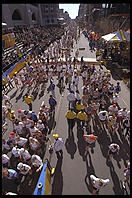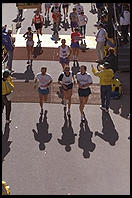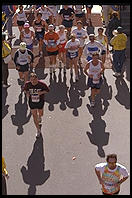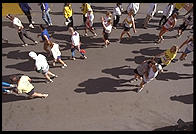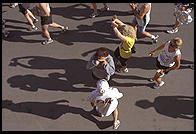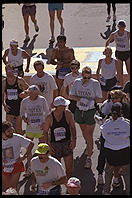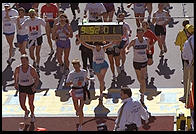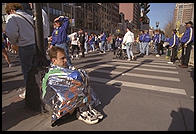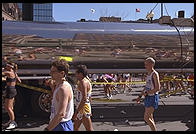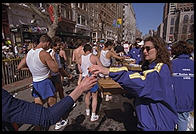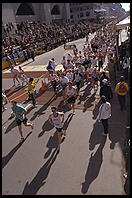
Boston Marathon 1996
by Philip GreenspunHome : Photography : One Exhibit
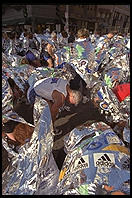
 |
Boston Marathon 1996by Philip GreenspunHome : Photography : One Exhibit |

|
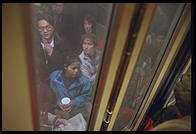 Just getting to the 100th anniversary of the Boston Marathon was a
challenge. People walked for miles from their cars or stood
mournfully on the green line platforms waiting for a subway car with
space. Even if you do have a press pass, it helps to be tall
if you want to see anything.
Just getting to the 100th anniversary of the Boston Marathon was a
challenge. People walked for miles from their cars or stood
mournfully on the green line platforms waiting for a subway car with
space. Even if you do have a press pass, it helps to be tall
if you want to see anything.
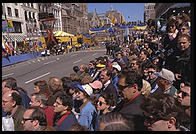 You can't get anywhere near the finish line unless you show up hours
in advance, are press, have volunteered to work for the Marathon, or
have some connection with John Hancock, the Boston-based insurer that
sponsors the event.
You can't get anywhere near the finish line unless you show up hours
in advance, are press, have volunteered to work for the Marathon, or
have some connection with John Hancock, the Boston-based insurer that
sponsors the event.
Having started at noon, at 2:09:15, Moses Tanui (Kenya) crosses the finish line...
Followed by some fellow Africans looking none-too-cheerful ...
(Cosmas Ndeti (Kenya) at left; Abebe Mekonnen (Ethiopia) at right)
And then Stephen Moneghetti (Australia), followed by Luiz Dos Santos (Brazil, finished 11th at 2:11:48)...
Followed by Uta Pippig (Germany, 2:27:12), looking pretty happy to be winning her 3rd Boston Marathon and Tegla Loroupe (Kenya, 2:28:37), a painful few hundred yards behind...
And then a whole bunch more random men...
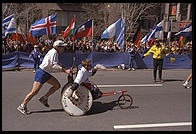
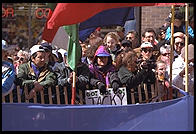
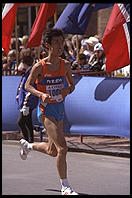
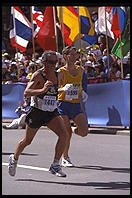
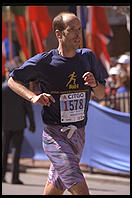
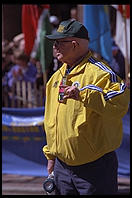
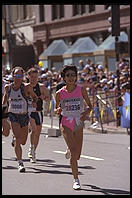
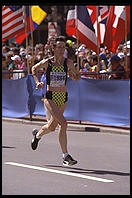
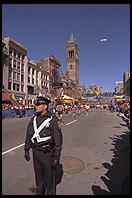
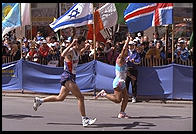
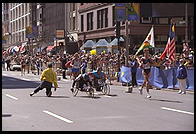
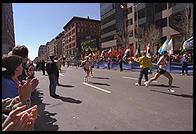
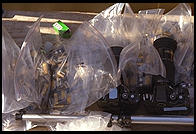 First, remember to take plenty of film. One hundred rolls might be
nice for starters (note that the bags at right contain Ektapress, a
color negative film very forgiving of exposure errors so you can even
use autoexposure).
First, remember to take plenty of film. One hundred rolls might be
nice for starters (note that the bags at right contain Ektapress, a
color negative film very forgiving of exposure errors so you can even
use autoexposure).
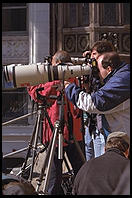 Then get yourself a big honkin' white lens. These guys have Canon
600/4's which cost $8500 and come in their own suitcases. You don't
absolutely have to have Canon to be a sports photographer. I saw an
AP photographer there who was a real man. An Asian of slight stature,
he was handholding a Nikon 300/2.8 while another Nikon body and
80-200/2.8 was hanging from his shoulder. Usually just carrying the
80-200/2.8 is enough to make me want to lie down.
Then get yourself a big honkin' white lens. These guys have Canon
600/4's which cost $8500 and come in their own suitcases. You don't
absolutely have to have Canon to be a sports photographer. I saw an
AP photographer there who was a real man. An Asian of slight stature,
he was handholding a Nikon 300/2.8 while another Nikon body and
80-200/2.8 was hanging from his shoulder. Usually just carrying the
80-200/2.8 is enough to make me want to lie down.
The TV guys take even fewer chances. They were using Canon video zoom lenses: 6-500mm. That is not a typo. 6-500.
And this would be the result....
Again, this time horizontally ...
40,000 runners is a lot...
